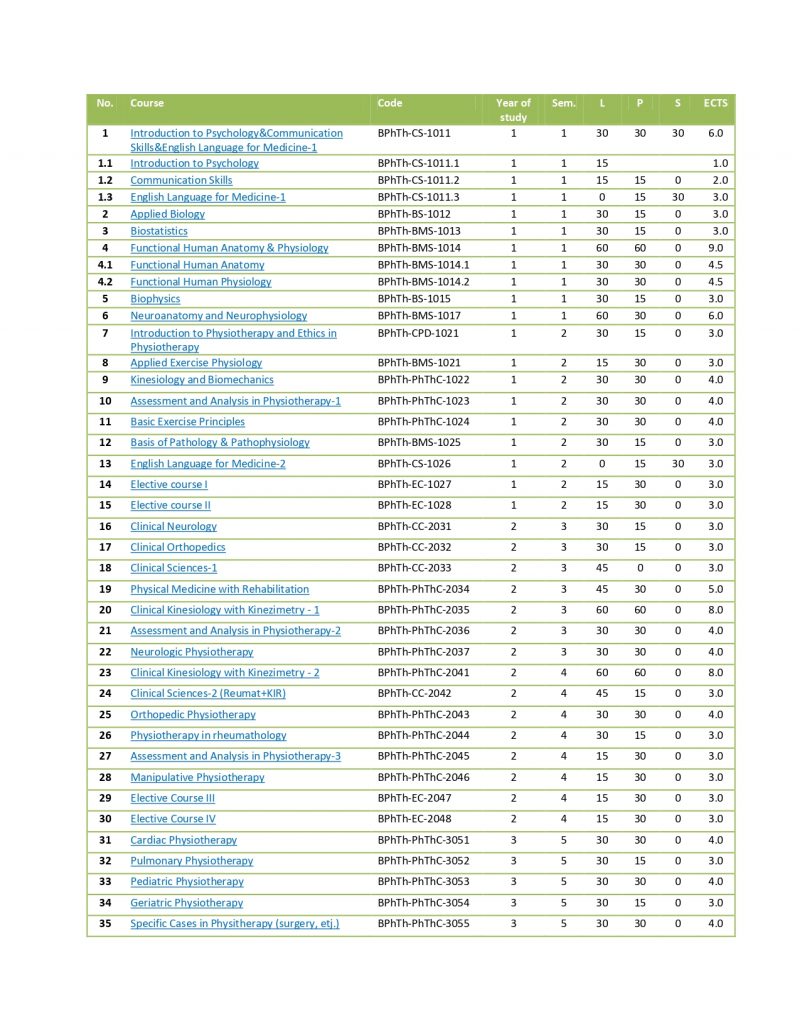BSc Physiotherapy (180 ECTS):
The BSc Physiotherapy program is modeled on qualification objectives. The BSc Physiotherapy program refers to academic competencies, the ability to obtain adequate employment to meet the needs of the labor market, the ability to obtain adequate employment by combining the theoretical with the practical aspect and the development of students’ personalities in specialization fields.
The BSC Physiotherapy program is in line with the National Qualifications Framework and the Qualifications Framework of the European Higher Education Area. One academic year corresponds to 60 ECTS credits. One academic year has 1800 teaching hours. The program is in line with Directive 2005/36 / EC and Directive 2013/55 / EU of the European Committee for the Medical Professions. As such the program is comparable to the programs of European Union countries. The program is designed in accordance with the Bologna Process, the first cycle of higher professional education, level 6 according to NQF / EQF .The individual components of the program are combined to best achieve the specified qualification objectives and provide adequate forms of teaching and learning.
The disciplines within the curriculum are organized in a logical flow and complement the precise definition and determination of general and specific competencies, as well as the compliance with the study programs and curricula submitted to ZEAL.
The learning outcomes for the BSc Physiotherapy program are:
- Ability to apply theoretically acquired knowledge and skills in the development, maintenance and restoration of movement, as well as functional skills of individuals and groups of all ages, as well as individuals and / or groups whose movement and functional ability are attacked , limited, affected or aggravated due to an illness or injury;
- Ability to apply critical thinking skills and judgment in planning, implementing and evaluating the effectiveness of the physiotherapy process;
- Ability to apply evidence-based theory from various fields to practical experience;
- Ability to perform autonomous tasks of the profession, make decisions and solve professional problems;
- Ability to analyze, synthesize and predict professional problems and solutions within a multidisciplinary team;
- Participate effectively in interprofessional approaches to health care delivery;
- Ability to apply research methods and procedures in the field of physiotherapy;
- Use some effective interpersonal skills in medical practice, based on the understanding of interpersonal relationships, the importance of communicating with patients, family, and other professionals involved in caring for these patients;
- Contribute according to talents and potentials, in the development of medical practice and its basic knowledge through clinical discussion of published work, careful observation or experimentation and rigorous analysis
- Accept the commitment to uphold the standards required by the patient, respect patients and patient confidentiality;
- Practice personal honesty and fulfill legal and ethical responsibilities by providing care for individuals, groups, and the general population;
- Maintain reflective, self-directed practice skills, continuing education and vocational training, along with a willingness to accept their limitations and seek help when needed.
